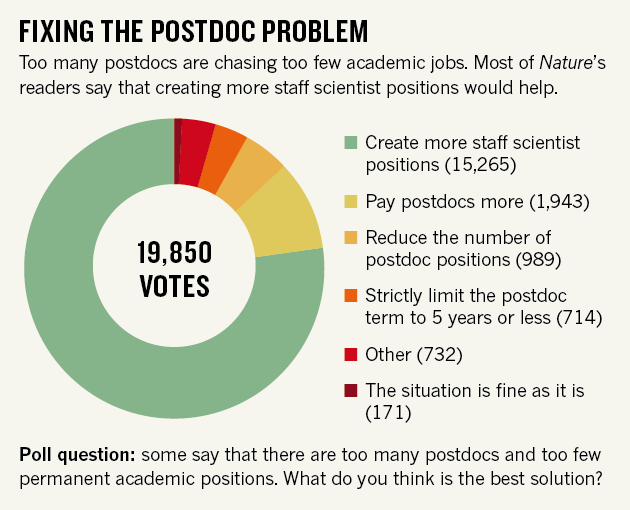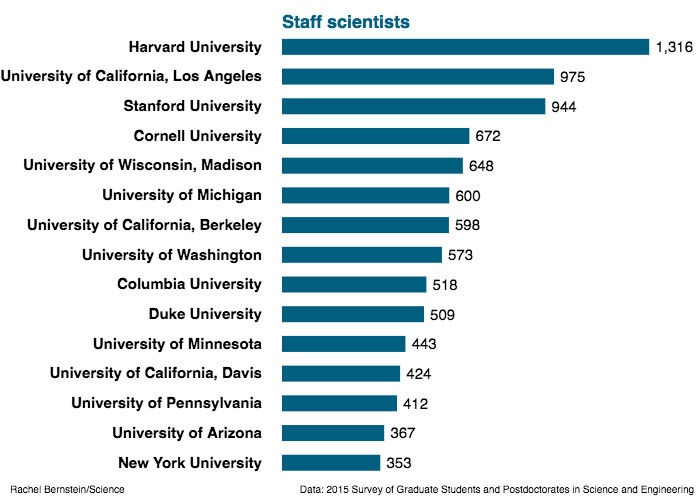By: Huri Mücahit Edited by: Manjula Mummadisetti and Aminat Saliu Musah The following blog post is a summary of “Biology needs more staff scientists” by Steven Hyman, “Staff scientists find satisfaction in playing the support role” by Maggie Kuo, and “Wanted: staff-scientist positions for postdocs” by Kendall Powell. To remain a research scientist, graduate students are expected to advance from graduate school, work as a post-doctoral student, and eventually, become an academic principal investigator (PI) running our own labs. Unfortunately, the likelihood of becoming a PI is becoming increasingly rarer, as less than 10% of PhD students will become tenure-track faculty. In addition, many students fantasize about freely leading innovative projects that interest them, however, they soon face the reality that projects requiring extensive collaboration must be avoided due to the lack of funding, resources, and time. The alternative is to become a “perpetual postdoc” in which PhDs sacrifice high salaries for the sake of remaining in science. To solve this problem, the Massachusetts Institute of Technology and Harvard University have launched the Broad Institute, employing “staff scientists” to circumvent the limitations posed by academic labs. Although seen by some as a “perma-postdoc”, staff scientists fill a crucial niche between faculty members and graduate students in that they have the experience students may not, but lack the obligations of faculty members to train students. As such, these scientists can lead projects, collaborate with faculty members and other scientists, and provide creative and innovative solutions that a faculty member may not be able to due to administrative and funding limitations. In addition, staff scientists can have the freedom to work at the bench without worrying about the administrative and grant funding requirements that PIs must focus on; essentially, staff scientists form a hybrid role between lab manager and research scientist for their PI. [caption id="attachment_2407" align="aligncenter" width="630"] Powell, 2015[/caption] While it may appear that there is no room to grow and succeed as a staff scientist, the opposite is true. Staff scientists have won 36% of federal grants as of May 2017, are invited to give keynote lectures, and can publish high impact papers on their own and through collaborations. In addition, working in a collaborative environment, such as the Broad Institute, which employs Harvard and MIT faculty members, as well as staff scientists, allows for mentoring opportunities. Staff scientists can educate laboratories about cutting-edge techniques and become a valuable resource due to their expertise. Such interactions provide a means for personal development. [caption id="attachment_2408" align="aligncenter" width="699"]
Powell, 2015[/caption] While it may appear that there is no room to grow and succeed as a staff scientist, the opposite is true. Staff scientists have won 36% of federal grants as of May 2017, are invited to give keynote lectures, and can publish high impact papers on their own and through collaborations. In addition, working in a collaborative environment, such as the Broad Institute, which employs Harvard and MIT faculty members, as well as staff scientists, allows for mentoring opportunities. Staff scientists can educate laboratories about cutting-edge techniques and become a valuable resource due to their expertise. Such interactions provide a means for personal development. [caption id="attachment_2408" align="aligncenter" width="699"] Staff scientists employed within academia, 2015[/caption] Why is there a resistance to the role of staff scientists? Many faculty members fear the potential competition for tight resources and funding, the perceived infringement on ideas, and the inability to keep up with staff scientists who do not have teaching responsibilities. In addition, staff scientists are seen as expensive when compared to postdocs. However, the truth is that although staff scientists earn double the pay of postdocs, they increase productivity due to their extensive training, and provide a means for education and support for their colleagues. To make the transition easier for faculty, institutions can provide opportunities for faculty members to play a key role during the hiring process, such as interviewing their future colleagues to better understand the potential for collaboration. Ultimately, while staff scientists may not follow the traditional path in research, their expertise, ability to train colleagues, and room for creativity provide key advantages to the scientific community. More importantly, such a position enables many scientists to earn a reasonable salary while remaining in science. When science advances, we all benefit.
Staff scientists employed within academia, 2015[/caption] Why is there a resistance to the role of staff scientists? Many faculty members fear the potential competition for tight resources and funding, the perceived infringement on ideas, and the inability to keep up with staff scientists who do not have teaching responsibilities. In addition, staff scientists are seen as expensive when compared to postdocs. However, the truth is that although staff scientists earn double the pay of postdocs, they increase productivity due to their extensive training, and provide a means for education and support for their colleagues. To make the transition easier for faculty, institutions can provide opportunities for faculty members to play a key role during the hiring process, such as interviewing their future colleagues to better understand the potential for collaboration. Ultimately, while staff scientists may not follow the traditional path in research, their expertise, ability to train colleagues, and room for creativity provide key advantages to the scientific community. More importantly, such a position enables many scientists to earn a reasonable salary while remaining in science. When science advances, we all benefit.
iJOBS Blog